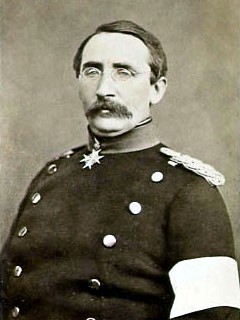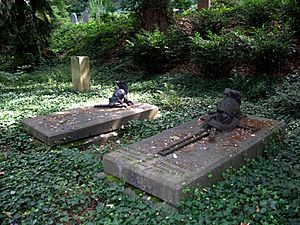August Karl von Goeben facts for kids
Quick facts for kids
August Karl von Goeben
|
|
|---|---|
 |
|
| Born | 10 December 1816 Stade, Kingdom of Hanover |
| Died | 12 November 1880 (aged 63) Koblenz, German Empire |
| Allegiance | |
| Service/ |
Prussian Army Imperial German Army |
| Years of service | 1833–1836 1844–1880 |
| Rank | General of the Infantry |
| Battles/wars | First Carlist War Second Schleswig War Austro-Prussian War Franco-Prussian War |
| Awards | Grand Cross of the Iron Cross |
August Karl Friedrich Christian von Goeben (December 10, 1816 – November 13, 1880) was an important Prussian general. He was a skilled leader in the army. He earned the famous Iron Cross award for his service in the Franco-Prussian War of 1870–71.
Contents
Early Life and Military Start
August von Goeben was born in Stade, a town west of Hamburg, in the Kingdom of Hanover. From a young age, he wanted to join the Prussian army, not his home country's army. When he was seventeen, he became an officer in the 24th Regiment of Prussian infantry.
However, there wasn't much exciting work for a young officer. So, in 1836, he left the Prussian army. He then joined the Carlist army fighting in the First Carlist War in Spain.
Adventures in Spain
Goeben fought for five campaigns with Don Carlos in Spain. He had many ups and downs during this time. After only two months of fighting, he was badly wounded and captured by the Spanish royalist troops.
He was held for eight months before he managed to escape. But it wasn't long before he was captured again. This time, his imprisonment was very difficult. He even had to draw lots with other prisoners to see who would live.
When he was finally released, Goeben continued to serve with distinction until 1840. After that, he returned to Prussia with no money.
Return to Prussia
Even though he had been a lieutenant colonel in the Carlist army, Goeben was happy to rejoin the Prussian service as a second lieutenant. He was only twenty-four years old, but he had already gained five years of valuable war experience.
Within a few years, he became a captain on the Great General Staff. This was a very important group of military planners. In 1848, he moved to the staff of the IV Corps. His boss there was Major Helmuth Graf von Moltke.
Goeben and Moltke became close friends and respected each other greatly. Goeben also showed his skills during the Baden uprising while working for Prince William, who would later become emperor. For several years, he switched between staff duties and leading troops. In 1863, he was promoted to major-general and given command of the 26th Infantry Brigade.
In 1860, he also joined Spanish troops in Morocco and took part in the Battle of Tetuan.
Leading in Major Wars

Goeben played a key role in Prussia's major wars.
Danish-Prussian War (1864)
In the 1864 Danish-Prussian War, Goeben led his brigade with great success. He was noted for his bravery at Rackebüll and Sonderburg.
Austro-Prussian War (1866)
In the 1866 Austro-Prussian War, Lieutenant-General von Goeben commanded the 13th Division. This division included his old brigade. In this bigger role, he again showed he was a natural leader and a smart planner. He led his troops almost independently and achieved great success in battles like Dermbach, Laufach, Kissingen, Aschaffenburg, Gerchsheim, Tauberbischofsheim, and Würzburg.
Franco-Prussian War (1870-1871)
When the Franco-Prussian War began in 1870, Goeben was put in charge of the VIII (Rhineland Province) Corps. This corps was part of the First Army, led by von Steinmetz.
Goeben's strong and energetic leadership was a major reason for the victory at the Battle of Spicheren on August 6. He also earned praise for his actions on the Prussian right side at Battle of Gravelotte on August 18.
Later, under General Manteuffel, the VIII Corps fought near Amiens and Bapaume. On January 8, 1871, Goeben took over command of the First Army from Manteuffel. Just two weeks later, he ended the war in northern France with a brilliant victory. This was the decisive Battle of St. Quentin on January 19, 1871.
After the Franco-Prussian War, Goeben was one of the most respected figures in the winning army. He became the colonel of the 28th Infantry Regiment. He also received the highest award, the Grand Cross of the Iron Cross. He continued to command the VIII Corps in Koblenz until his death in 1880.
Writings
General von Goeben wrote several books about his experiences. Some of his most known works include:
- Vier Jahre in Spanien (Four Years in Spain) (Hanover, 1841)
- Reise-und Lagerbriefe aus Spanien und vom spanischen Heere in Marokko (Travel and Camp Letters from Spain and the Spanish Army in Morocco) (Hanover, 1863)
- Articles in the Darmstadt Allgemeine Militärzeitung (Darmstadt General Military Newspaper).
Legacy
August von Goeben was honored in many ways. The former French fort de Queuleu in Metz was renamed Goeben after him. The 28th Infantry Regiment also carries his name.
A statue of Goeben, created by Fritz Schaper, was put up in Koblenz in 1884. A German Navy ship, the SMS Goeben, a Moltke-class battlecruiser launched in 1911, was also named in his honor.
Honours and awards
Goeben received many awards for his military service. Some of the most notable include:
 Kingdom of Prussia:
Kingdom of Prussia:
- Knight of the Red Eagle, with Swords
- Knight of the Crown Order, with Swords
- Pour le Mérite (military), with Oak Leaves
- Grand Commander's Cross of the Royal House Order of Hohenzollern, with Swords
- Grand Cross of the Iron Cross (1870)
- Knight of the Black Eagle
 Spain:
Spain:
- Knight's Cross of the Military Order of St. Ferdinand
- Knight's Cross of the Order of Isabella the Catholic
- Grand Cross of the Order of Charles III, with Collar
 Baden:
Baden:
- Knight of the Military Karl-Friedrich Merit Order
- Grand Cross of the Zähringer Lion, with Swords
 Oldenburg: Grand Cross of the Order of the Order of Duke Peter Friedrich Ludwig, with Swords
Oldenburg: Grand Cross of the Order of the Order of Duke Peter Friedrich Ludwig, with Swords Württemberg: Grand Cross of the Military Merit Order
Württemberg: Grand Cross of the Military Merit Order Russian Empire:
Russian Empire:
- Knight of St. George, 4th Class and 3rd Class
 Kingdom of Saxony: Commander of the Military Order of Saint Henry, 1st Class
Kingdom of Saxony: Commander of the Military Order of Saint Henry, 1st Class
 Austria-Hungary: Grand Cross of the Imperial Order of Leopold, with War Decoration
Austria-Hungary: Grand Cross of the Imperial Order of Leopold, with War Decoration
Portrayal in media
In the Danish TV show 1864, Goeben was played by Czech actor Karel Dobrý.
See also
 In Spanish: August Karl von Goeben para niños
In Spanish: August Karl von Goeben para niños
 | Georgia Louise Harris Brown |
 | Julian Abele |
 | Norma Merrick Sklarek |
 | William Sidney Pittman |

